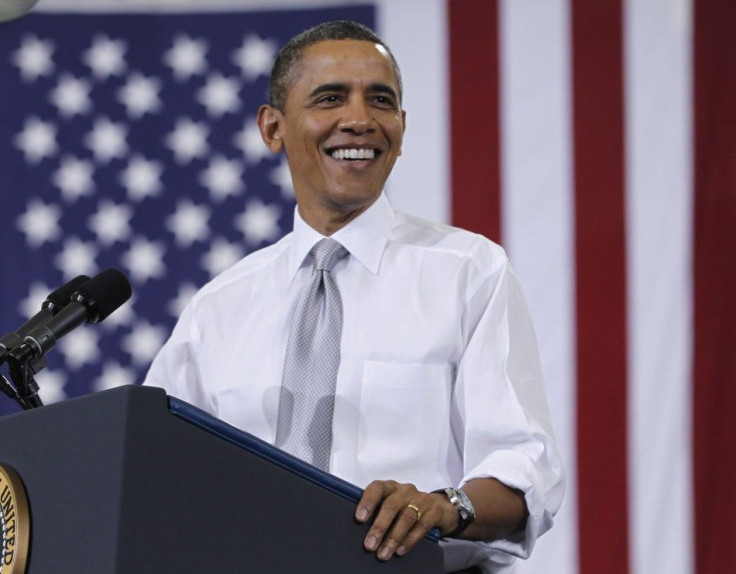Obama Has Edge Over Romney in Small Donors

(Reuters) - It does not guarantee him re-election in November, but it is an advantage President Barack Obama is likely to carry into the fall: a broad base of supporters who have given him the symbolic vote of confidence with a donation of less than $200.
Known as small donors, these people are personally invested in a candidate's march to becoming president, many ready to become active at the ground level as foot soldiers of the campaign.
Financial disclosures last week showed Obama's campaign in 2011 raised 60 percent of its funds, or $58.5 million, from donors who gave less than $200.
The average listed donation to the Obama campaign in the last three months of the year was between $100 and $200, according to a Reuters analysis of the Federal Election Commission filings.
Campaigns are not required to list donors who gave less than $200 in total, but they have to list those who exceeded that amount even if it came in multiple smaller sums.
In 2008, such small donors helped sweep Obama into the White House, but pundits remain skeptical whether the president would be able to energize them this time around, with his popularity undermined by a long slog to U.S. economic recovery.
Republican candidates, unlike uncontested Obama, are caught up in a heated primary season, splitting the small donors among them.
The campaign of the Republican front-runner Mitt Romney in 2011 raised only 9 percent of its total funds, or $5.2 million, from donors who gave less than $200, FEC filings show. The average listed donation was between $900 and $1,000 in the fourth quarter of 2011, according to the Reuters analysis.
In the last three months of the year, Obama received four times as many donations as did Romney. The numbers included repeat contributions from the same people.
This has the potential to be a strategic advantage for Obama, said David Magleby, political scientist at Brigham Young University in Utah and campaign spending expert. That kind of involvement conveys a more substantial psychological investment ... They have a sense of ownership of the campaign.
KEEPING THEM ACTIVE
On April 4, 2011, the first day of the official launch of the campaign, the Obama 2012 team sent its first email to supporters, asking for donations. Their grassroots effort four years ago went down in political history books as the most organized digital attempt at rounding up supporters, and they are preparing to repeat it.
The Internet spawns a large chunk of small donors thanks to easy and quick access. A growing amount of the campaigning has been done online, targeting voters on Facebook and Twitter, and through Google, Youtube and online Hulu television ads.
Of some 300 people in Obama's Chicago campaign headquarters, the digital team is the largest, said one campaign official working there. The team includes video and graphics producers, advertising strategists and members interacting directly with voters. They work quietly on the margins, but their work has never stopped since the victory in November 2008.
The Romney team's digital chief Zac Moffatt told the Atlantic magazine last month that his team had 10 people and started the 2012 campaign from scratch, focusing first and foremost on the primaries and preparing to switch gears for the Nov. 6 general election.
Keeping the small-donor base active is a very important part of the strategic plan for any campaign ... Governor Romney hasn't had that luxury yet, said Peter Pasi, a Republican digital fundraiser.
Small donors are an important indication of strength and it's a hole that any Republican nominee is going to have to fill, he said.
Moffatt did not respond to a Reuters request for an interview.
'NEVER TOO EARLY'
In 2008, the Obama campaign received some 30 percent of donations in low-dollar amounts in the campaign to secure the Democratic Party nomination, according to the Campaign Finance Institute data.
Romney, who lost the Republican nomination that year to Senator John McCain, relied on small-donor contributions for about 8 percent of his fundraising, the data shows. For McCain, it was 21 percent.
Romney, a wealthy former private-equity executive, has faced criticism that he is detached from the voters struggling with the economic downturn and high unemployment.
Obama, who in 2008 garnered important backing from Wall Street, has sought to emphasize a populist message in his campaign.
Historically, the Democratic National Committee has lagged behind the Republican National Committee in appealing to the small-check donors as the RNC has mastered the direct mail and phone method. But in the past few years, the technology has transformed radically and Democratic candidates have outdone Republicans in adopting it in campaigning.
Small dollar donors ... are our grassroots who back up their monetary support with phone calls and door knocks - they are our boots on the ground and we do everything we can to reach out to them, RNC spokeswoman Kirsten Kukowski said in an email.
RNC is set to raise funds from many Americans who are disheartened with Washington and want to defeat Obama regardless of who becomes the Republican pick.
Romney would be positioned to take advantage of those RNC efforts and that population, but not until and unless he gets the nomination. Obama, in the meantime, can count on the DNC and the joint fund he has with the party, which predominantly attracted donations of more than $200.
But waiting for the general election to step up the appeal to the small donor could be risky. Campaign Finance Institute's Michael Malbin said that while a deep-pocketed campaign such as Romney's could pay organizers to match Obama's grassroots efforts, the proposition is expensive and inefficient.
It's never too early to worry about how many donors you've got, said Pasi. By allowing people to participate in the process, you create an evangelist for your cause.
(Additional reporting by Eric Johnson; editing by Marilyn Thompson and Mohammad Zargham)
© Copyright Thomson Reuters {{Year}}. All rights reserved.





















